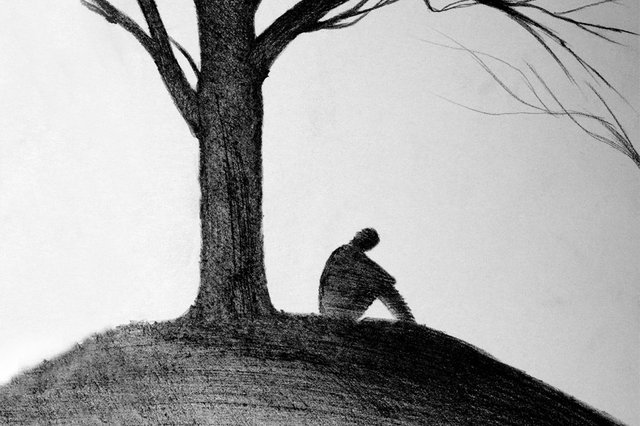Grief and the cost of traits
I realize that the topic of evolutionary psychology is not fascinating to everyone, but I can't help but to be enamored with the concepts I keep on learning everyday. In other words, I realize this might make me a geek, but I relish the label anyways. Yesterday, as I was exploring the subject I came across this concept, the idea that all traits, all features, have a cost, and it must then have an ROI for it to continue to exist. ROI? I thought - sign me up.

img src
It didn't take much convincing for me to be complete immersed in this line of thinking. All of the sudden things became much clearer, and some of "the flaws" of mankind, some of the things I honestly don't know why they exist, started to become justified.
I mentally landed on grief, because for the life of me, I've never been able to understand why we suffer so much when we lose someone. Please note, I do not question that we suffer, this is obvious, and it's also very true for me, but the "advantage" of suffering, hence the reason why we would, that concept escaped me.
Turns out I had been wrong all along, there is no benefit to grief at all, at least not intrinsically, and grief is nothing more than a process we must endure as a cost of one our most powerful tools: Social Cooperation.
If you are still with me, which I suspect not everyone will read this far. The idea can be broken down like this, or more accurately said, it can be framed like this: Are humans the only creatures that grief? Well, the obvious answer is no. As a matter of fact Chimpanzees do too, and our best friends, the dogs, they grief as well. It turns out there are plenty of examples of animals that grief loses, and the one thing they have in common is that they are highly social creatures.
You see, the eureka moment lies on that very detail. A highly social creature creates a deep weaving of expectations due to the interactions it has with its family and friends. These become routines, safety nets, both emotionally and more physically, but the mental machinations are deeply rooted.
These interlocked dynamics, the set of expectations, the trust built, the affinity, etc, things we can simplify as tribal cohesion, allow us to collaborate dynamically and at scale, thus permitting us to achieve great feats at times. Through our highly evolved social skills, we developed macro concepts we use commonly like societies, but let's not think for a second that these traits, our high social abilities come at no cost. Yes, their ROI is fantastic as I've pointed out, but the cost is just as great.
So what does our brain actually do? How does it cope with expectations not met, with the removal of a deeply woven social interaction? Well, it goes through a process of recategorization, which is basically what grief does. It allows us to "pay the tab" so to speak, rework our memories of the person we lost, allowing us to once again reset expectations, remove most of the negative aspects (because nobody is perfect) from the social dynamic we can remember, and file it, if you will, under the bitter sweet memories, that archive that holds important subconcious lessons of life.
If you've read this far, and this made sense to you, let me know. And yes, the answer is I am a bit crazy.
Man if you are not crazy in this world you are crazy! if you know what I mean. ;)
True man it's just basically the symptom of you rearranging yourself emotionally and mentally.
A recalculation of your mind I can call it, like waze whenit recalculates when the road is blocked or you go to some other direction! hehe :D
An interesting review @meno and I myself until the end do not understand such a state of mind as grief, but I think that this is inherent in us by nature.
An interesting theory. This topic is very complex and everyone can interpret the described in different ways. It is possible to consider grief and other negative emotions as a “price” for the time spent with a person, you can refer to psychology or a cocktail of hormones that control our lives.
Much love and respect brother. I love your kind of "crazy" 🙏🏼 😊
Greetings @meno
As far as I can understand from your publication, we must generate enough sentimental or existential resources to be able to face the costs of the experiences. All good or bad experience, it will cost us effort to live it, and if we do not have enough energy we can be in negative balance. We must do everything possible to have a balanced life.To listen to the audio version of this article click on the play image.

Brought to you by @tts. If you find it useful please consider upvoting this reply.
While I recognize much truth in your description of the grieving process, I note that it's pretty general. PTSD and similar states aren't included in the precis you provide here, and they are very real. There's more to grief than recovery. Some things cannot be recovered.
Thanks!